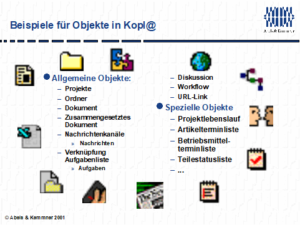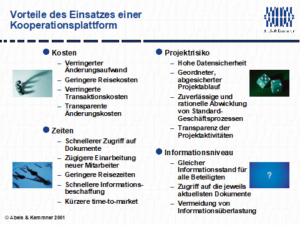Kopl@ supports the decentralized processing of projects
by Dr. Götz-Andreas Kemmner and Martin Jürgens
Do you have any problems with project work? We devote a large, important part of our personnel resources to project and administrative work. The more development and services a company offers, the more project work is involved. But that’s not all. The market demands ever faster action. This means that any kind of project work, not just development projects, is under considerable time pressure. The projects themselves are becoming increasingly complex and require more specialist knowledge and therefore more team members.
Collaboration with partner companies, suppliers and customers across company locations, countries and continents is becoming increasingly important. This has long been the case for large companies, but increasingly also for SMEs. The Gebr. Wasserloos GmbH, a manufacturer of progressive stamping tools with around 60 employees and a member of the project described here, develops and supplies tools for the BMW Spartanberg plant in the USA from its Velbert site. C.W. Hanebeck GmbH, another project member, also manufactures stamped parts with 60 employees and cooperates with a subsidiary in Italy.
For the project work itself, this means that it is becoming increasingly difficult for project managers, members and management to maintain an overview of the projects. Due to missing or inconsistent information (what is the current version of the protocol?), the time and costs for changes increase, and travel costs and times explode.
In order to ease the situation on the project front, Abels & Kemmner has been working together with six automotive suppliers since July 1999 on the organization and development of an Internet-based cooperation platform that supports the decentralized handling of development projects between several companies.
This cooperation platform, called Kopl@, is intended to be a kind of shared virtual office where all project members can work together, no matter where they are in the world. All project documents and other information are stored in this shared office. Employees are supported in their search for information by a search system that creates a running full-text index and can execute complex search queries in dialog.
Recurring organizational processes are stored in predefined “workflows” and users are automatically informed about new or changed information and documents that affect them. Project handling and transparency are supported by joint task management and, if required, by joint scheduling coordination.
In the case of product development projects, the product development process is structured and channeled through project phases with gate reviews and tracking documents. This means that project activities remain transparent not only for the project team members and the project manager, but also for members of an extended project team, the sales department and the management. The frequency of face-to-face meetings can be reduced and all those affected have the same level of information.
To cover this extensive range of services, Kopl@ relies on the Livelink® e-management tool from Opentext. In accordance with the structure of Livelink, the Kopl@ user moves through three work areas. Information that only the user has access to can be stored in the personal workspace. Project teams work together in project areas, while the company workspace is available as a forum and source of information for all Kopl@ users. In the three work areas, the methods shown in Fig. 1 listed objects. As the confidentiality of data and information is important in product development, Kopl@ offers a sophisticated authorization system. Users can be granted different access rights depending on their group membership and their role in projects, and individual access rights can also be defined for each object.

Working with Kopl@ saves users time and effort, as information can be obtained more easily and quickly and tasks are less likely to be returned to the user’s desk for reworking or modification (Fig. 2). From the company’s point of view, development efficiency is improved, development times are shortened and development costs are reduced.
The more projects are processed with Kopl@, the more users work with the system and the more documents are stored in Kopl@, the larger the knowledge base becomes that can be accessed within and across companies. As the value, success and viability of a company are increasingly determined by the knowledge available within a company, the use of a cooperation platform is gaining strategic importance today.


